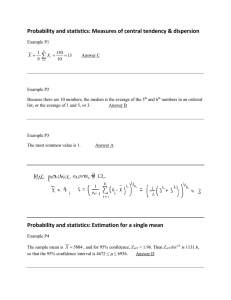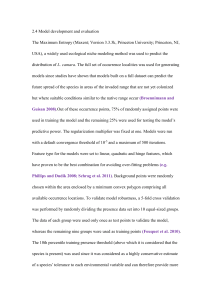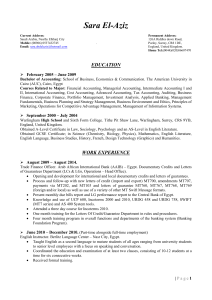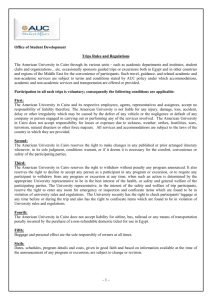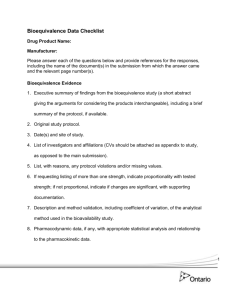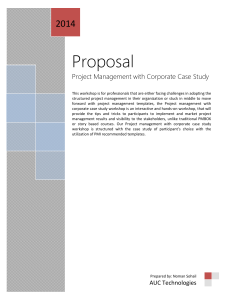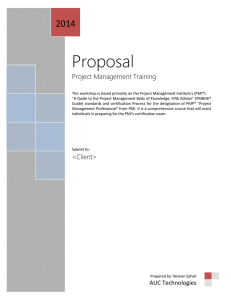Copyrights and your website
advertisement
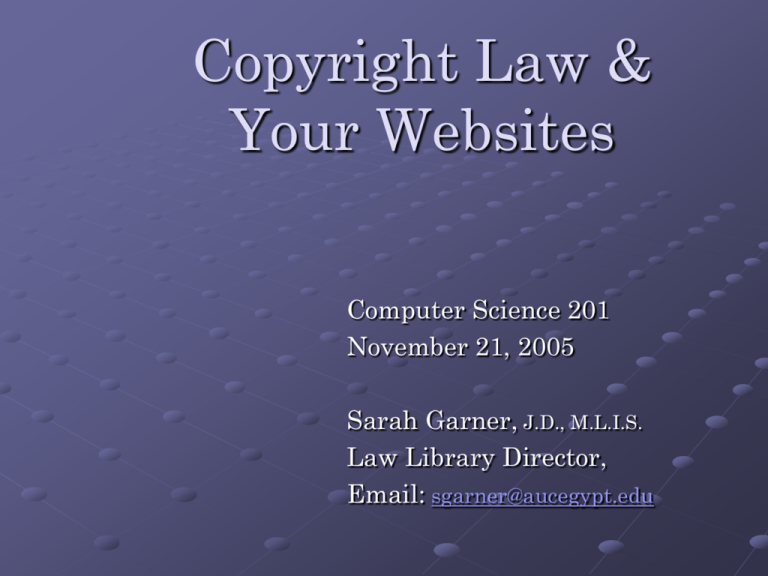
Copyright Law & Your Websites Computer Science 201 November 21, 2005 Sarah Garner, J.D., M.L.I.S. Law Library Director, Email: sgarner@aucegypt.edu AUC & Copyright AUC is in Egypt, but follows U.S. Copyright law U.S. “works” protected by U.S. Law AUC students often use works by American authors Words, tables, graphs, pictures What to do? Abide by U.S. laws! Copyright & Plagiarism Avoiding plagiarism requires careful citation of other’s ideas and words See AUC’s Academic Integrity Code Avoiding copyright violations requires: Using others’ work within legal limits Applying “Fair Use” test Origin of U.S. Copyright Law U.S. Constitution gave Congress the power to “Promote the Progress of Science and Useful Arts” Provides incentive for creativity Copyright protects AUTHORS Not Publishers Not Libraries U.S. Copyright Law Creators of “original works of authorship” receive copyright protection, which automatically extends to any such work that is “fixed in any tangible form of expression” - 17 U.S.C.§ 102 (a) Copyright protects: Published and unpublished creative work, in any medium in which they are created or reproduced, in print or digital form, e.g. Printed materials, sound recordings, video recordings, visual artworks, computer software, web pages, and multimedia works Rights of Authors American authors, or foreign authors publishing in America, have 5 exclusive rights: Reproduction Preparation of derivative work Distribution Display, and Performance 17 U.S.C. §106 Copyright Protection Authors can give up some of their rights Creative Commons licenses Public Domain materials are not protected Expired copyright United States Government documents AUC In Practice Faculty & Students regularly: Download information from electronic databases Print from a website Photocopy articles Use others’ work in their own papers, videos, websites, etc. = COPYRIGHT VIOLATION Fair Use Exemption: 17 U.S.C §107 Allows limited use of copyrighted works without author’s permission Generally applicable to academic work (scholarship, teaching & research) All academic work is not automatically exempt Requires applying “Fair Use “ Test “Fair Use” Test All four criteria must be met: 1. 2. 3. 4. The purpose and character of the use, including whether such use is of a commercial nature, or is for nonprofit educational purposes; The nature of the copyrighted work; The amount and substantiality of the portion used in relation to the copyrighted work as a whole; and The effect of the use upon the potential market for or value of the copyrighted work - 17 U.S.C. § 107 How to Apply “Fair Use” Test You must scrutinize your use of “expression” of other’s work Every image, document, sound bite, etc. Every single time! Sometimes easy to do Sometimes hard to do DANGER: From UMI Long Quotations Reproduced Format Poetry Dialogue from play, screenplay, broadcast, or novel Music DANGER: Graphics or Pictorial Works Reproducing CHART, TABLE, GRAPH, DRAWING Copies author’s entire work “Amount” factor weighs against “fair use” What if using the whole thing is only meaningful use? Must relate to research objectives, critical analysis and not supersede market for original DANGER: Internet Sources Text, graphics, everything is available on Internet STILL SUBJECT TO COPYRIGHT! On web = book Apply “Fair Use” test “nature” may be wide use “effect” of unrestricted access may favor “fair use” Practical Tips You can link to another website without permission, if is clear that it is not your website. Acknowledge source at link Cite all your sources date your pages Ask permission of copyright owner before putting up any photos or text that don’t belong to you Practical Tips Access to works on the Internet does not mean you can reproduce them and reuse them without permission. Work may have been posted to Internet without permission Permission to use work may have been granted only to particular site Practical Tips for “Fair Use” Motion media: up to 10% or 3 minutes (WIL) Text: up to 10% or 1000 words (WIL) Music/lyrics/video: up to 10% or 30 seconds (WIL) Database information: up to 10% or 2500 fields/cell entries (WIL) Photos and images 1 creator – up to 5 works Collection: up to 10% or 15 works (WIL) Poems One poet – up to 250 words or portions of poems Multiple poets – 5 poems or portions of poems from an anthology How to Comply with U.S. Copyright Law Apply “Fair Use” Test Get permission if necessary Cite properly For Help: AUC Writing Center How to Get Permission Determine copyright owner Write a letter or email requesting permission See sample letter at Http://www.umi.com/umi/dissertations/ copyright/AppxA.html Trying is not good enough Copyright owners have no obligations Can demand royalties So What? I’m in Egypt! You must consider repercussions of copyright violations Deliberate infringements are unethical Violating AUC Academic Integrity Code may prevent receiving degree Affects professional reputation Conclusion Copyright compliance sounds boring and like a lot of work, but A violation is theft from an author Keep the Spirit of the Law in mind Copyright is intended to: “promote the Progress of Science and Useful Arts” Applies to “Fair Use” too!
